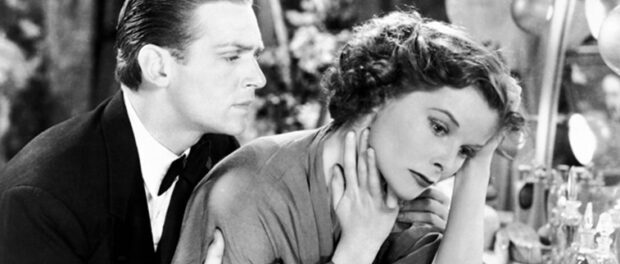Morning Glory (1933)
[5]
Katharine Hepburn won the first of her record four Oscars for this film about a naïve, aspiring actress who ingratiates herself into the Broadway social circle. She isn’t taken seriously at first. In fact, she’s pitied. But a childish sense of self-confidence helps her endure until the opportunity arises to show the theater world what she’s got.
The story of Morning Glory is a bit wonky — trite and predictable in its broad strokes, puzzling and peculiar in some of its details. We’re introduced to Hepburn’s character alongside another played by Mary Duncan. Duncan plays an actress in her prime who feels the world owes her everything. The contrast between the two makes it pretty obvious where the film is headed. The only surprises along the way stem from an awkward love triangle between Hepburn and two theater gurus played by Adolph Menjou and Douglas Fairbanks Jr. The romance is wedged into the film so messily, that it taints all three characters involved. And then there’s an extraneous last-minute philosophical crisis that hits Hepburn’s character in the final few minutes — will she be a one-hit wonder, or a star who’ll shine for a long time to come?
As wobbly as Morning Glory is, it’s well-paced and over at 74 minutes. The actors largely succeed in overcoming the material. Hepburn’s role can be obnoxious at times, but her performance is interesting in places, especially when she effectively drunk-auditions at a party. Duncan is one-note as her exaggerated adversary. But the rest of the cast service the film admirably, especially Menjou and Fairbanks. C. Aubrey Smith is also memorable as an older actor who takes Hepburn under his wing.
Academy Award: Best Actress (Katharine Hepburn)


